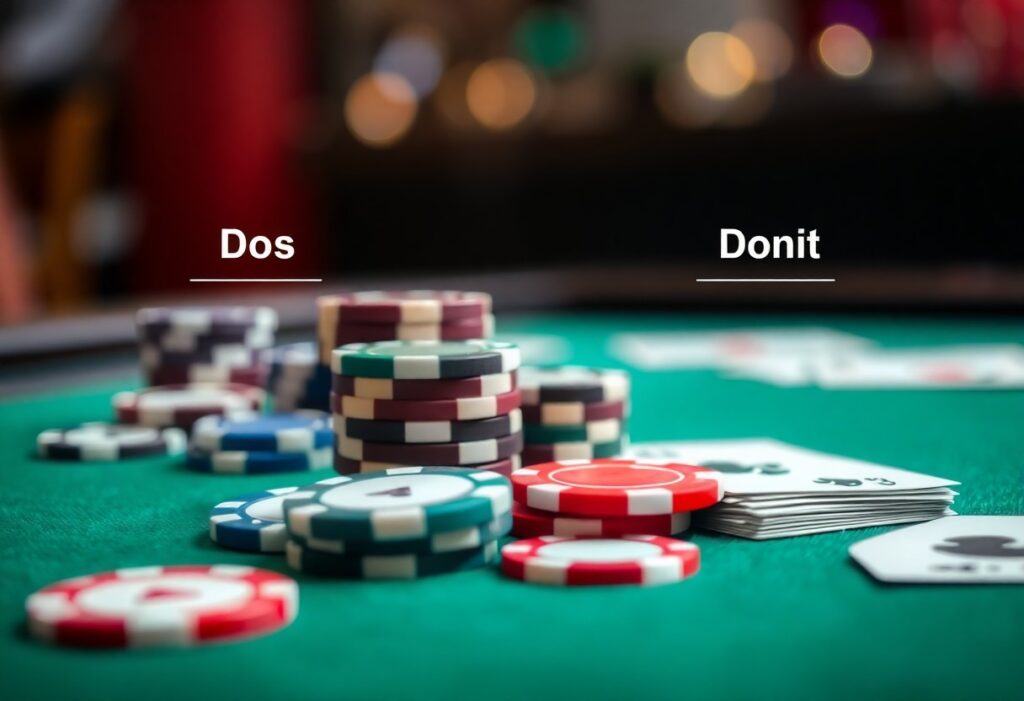
Just as skill and strategy are vital to poker success, understanding casino etiquette can greatly enhance your experience and interactions at the table. This guide outlines important do’s, like being respectful to dealers and fellow players, and don’ts, such as disruptive behavior and discussing hands in play. Knowing these polite practices fosters a positive environment and helps maintain the integrity of the game, ultimately benefiting all players involved.
Types of Poker Games
Understanding the various types of poker games is imperative for any player looking to engage properly within the casino environment. Players can choose between cash games, tournaments, and other variants, each offering unique dynamics and strategies. It’s important to know the specific rules and etiquette associated with each format to enhance your gaming experience.
- Cash Games: Players buy in for a specific amount and can leave at any time.
- Tournaments: Players pay a buy-in to compete for a prize pool, with eliminations until only one player remains.
- Formats: Variants include Texas Hold’em, Omaha, and Seven Card Stud, each with its own set of rules.
- Blinds/Antes: Different structures exist, such as blinds in cash games and antes in tournaments.
- Player Dynamics: Understanding player types can adjust your strategy effectively.
Thou must familiarize yourself with each game’s nuances to navigate the poker scene successfully.
Cash Games
Cash games offer a flexible and less formal structure compared to tournaments. Players join by purchasing chips equivalent to the cash value they wish to gamble, allowing them to leave after any hand. This setup provides an opportunity for strategic play, as you can quickly adapt your tactics based on your opponents. Additionally, the ability to adjust your buy-in helps to manage your bankroll effectively.
Tournaments
Tournaments involve players paying a fixed buy-in to compete for a prize pool, with the structure leading to player eliminations until a winner is crowned. Players receive a set number of chips that diminishes in value as the blinds increase, adding urgency to the game. Unlike cash games, players cannot withdraw their chips for cash until the tournament concludes, intensifying the competitive atmosphere.
Tournaments often feature several levels, with increasing blinds designed to push players to be aggressive and strategic in their play. Knowing the payout structure is vital; typically, only a fraction of players profit, making survival key. Players must adopt a mix of tight gameplay early on, moving to more aggressive strategies as the tournament progresses, especially when approaching the bubble. Awareness of chip management and adjusting your approach is imperative for success in such competitive settings.
Essential Poker Etiquette Tips
Mastering etiquette at the poker table is crucial for fostering a positive environment. Adhering to these guidelines can enhance your gameplay and relationships with others. Key points include:
- Maintain a reasonable tone and language.
- Always tip your dealer appropriately.
- Keep your actions clear and decisive.
- Be conscious of your chips and cards at all times.
- Respect personal space and avoid distractions.
The importance of these practices can greatly enhance the overall experience for everyone involved.
Actions at the Table
When playing, your actions at the table should be deliberate and respectful. Players should take their turn promptly and avoid excessive time on decisions to prevent slowing the game. Always use clear hand gestures for betting, folding, or calling to avoid confusion. Additionally, be organized with your chips; an uncluttered area makes for smoother play. Awareness of the flow of the game is crucial to maintaining a friendly atmosphere.
Communication with Dealers and Players
Effective communication is vital when interacting with dealers and other players. Use polite language, maintaining respect and courtesy, whether you’re asking for assistance or engaging in casual banter. Acknowledge the dealer when they provide services like shuffling or dealing cards. Avoid loud and disruptive conversations that could disrupt the game. Mutual respect creates a more enjoyable atmosphere and can lead to better gameplay experiences.
The way you interact with dealers and players can significantly influence the mood at the table. A simple gesture, like thanking the dealer after they handle a tough situation, can promote a friendly vibe. Engaging in light-hearted conversation can also ease tensions, especially in high-stakes situations. Developing a rapport with fellow players encourages camaraderie, making the experience enjoyable. Just remember to keep conversations relevant and focused on the game to respect everyone’s time and attention.
Step-by-Step Guide to First-Time Casino Visits
| Understanding the Layout | Familiarize yourself with the casino’s layout to navigate effectively. Most casinos are large, with separate areas for different games, dining, and entertainment. Take a moment to grab a map or ask staff for directions to the poker room and other areas of interest. |
| Registering for a Game | Joining a game requires understanding the registration process. Most poker rooms operate on a first-come, first-served basis. Approach the designated registration area and provide your details to secure a seat at the table. |
Understanding the Layout
Each casino presents a unique layout that can initially feel overwhelming. Zones for poker, table games, and slot machines are typically segmented, making it imperative to identify where to go. Having a casino map handy assists in promptly locating facilities like restrooms and cashiers, streamlining your experience.
Registering for a Game
Securing a spot at the poker table starts with the registration process. Approach the poker room’s registration desk and notify the staff of your game preference. Some casinos may require you to join a waiting list, especially during peak hours. Efficiently communicating your needs ensures a smooth transition to the game.
Upon reaching the registering counter, indicate the specific type of poker game you want to play. If it’s a high-traffic time, be prepared for a waiting period. Many casinos utilize a digital system to track players waiting for a seat, allowing you to monitor your position. It’s advisable to arrive early and check in advance as some tables may fill up quickly, especially during tournaments or special events.
Factors Influencing Poker Etiquette
Multiple elements shape poker etiquette, guiding players towards respectful interactions. Understanding table dynamics, recognizing the casino culture, and being aware of your surrounding players are fundamental. Personal behavior and attitudes also play a significant role in how etiquette is perceived and practiced. The right etiquette enhances the gaming experience for everyone involved.
- Table dynamics
- Casino culture
- Player behavior
Table Dynamics
In poker, table dynamics refer to the interactions between players, which can significantly influence the flow of the game. Factors such as player aggression, experience levels, and even body language contribute to these dynamics. Experienced players often adjust their strategies based on the behavior of their opponents, making it crucial to remain aware of the table’s atmosphere while maintaining proper decorum.
Casino Culture
Casino culture varies from one establishment to another, often reflecting the local community’s overall gaming values. In some casinos, a relaxed and informal atmosphere thrives, encouraging casual interactions among players. Conversely, others may uphold a more traditional and serious environment. Understanding these cultural nuances can be pivotal for players to fit in, allowing them to engage with fellow gamers appropriately.
Recognizing the nuances of casino culture can greatly enhance a player’s experience at the table. Each casino may have its own set of unspoken rules, influenced by factors like location and clientele. For example, venues in Las Vegas might exhibit a more flamboyant culture, while those in quieter towns prefer a more subdued ambiance. Adapting to these cultural distinctions helps players navigate social interactions effectively, promoting a harmonious gaming environment.
Do’s for Poker Players
Respect for Other Players
Fostering a respectful environment is key to enjoyable gameplay. Always be polite, avoid distractions, and keep conversations appropriate. Engaging in friendly banter is fine, but be mindful of your tone; excessive criticism or disruptive behavior can turn the atmosphere sour. Acknowledging your opponents’ skills can also create a more positive gaming experience for all involved.
Proper Bankroll Management
Effective bankroll management ensures longevity in poker, allowing players to withstand variance. Set aside funds that you can afford to lose, and avoid dipping into savings. Aim to play within your limits; for instance, a common rule is to have at least 20 times the buy-in for cash games. Tracking your wins and losses helps maintain discipline and adjust strategies as needed.
For example, if you’re playing a $1/$2 cash game, having a bankroll of at least $400 is advisable. This gives you enough cushion during losing streaks, while also allowing for proper betting strategies. Sticking to these guidelines helps prevent emotional decision-making and encourages a more calculated approach. Many successful players attribute their longevity in the game to strict adherence to bankroll management principles.
Don’ts for Poker Players
While understanding what to do at the poker table is important, avoiding certain behaviors is equally vital. Making careless mistakes or exhibiting poor conduct can ruin the experience for everyone involved. Focus on maintaining decorum and recognizing behaviors that could lead to conflicts or penalties, ensuring a respectful and enjoyable game for all players.
Disrespectful Behavior
Exhibiting disrespectful behavior, such as talking over other players, using foul language, or intentionally distracting opponents is unacceptable. Such actions not only diminish the atmosphere but can also lead to disciplinary measures from the casino. Remaining courteous helps to promote a positive gaming environment.
Cheating and Collusion
Engaging in cheating or collusion is the quickest way to jeopardize your standing at any poker table. This includes sharing information with accomplices or manipulating the game in your favor through dishonest means. Casinos take such infractions seriously, often resulting in immediate expulsion and potential legal consequences.
Cheating and collusion not only undermine the integrity of the game but can also result in serious repercussions. Many casinos employ surveillance systems designed to catch dishonest players. For example, players caught colluding can face bans that extend beyond the casino’s premises, affecting their reputation across multiple establishments. It’s imperative to play fairly, as fostering trust among players promotes an enjoyable experience and ensures the longevity of the game itself.
Final Words
Conclusively, adhering to imperative casino etiquette enhances the poker experience for everyone involved. By respecting the rules, maintaining a courteous demeanor, and understanding the nuances of gameplay, players create a more enjoyable atmosphere. The dos promote fair play and foster camaraderie, while the don’ts help avoid conflicts and maintain decorum. A well-mannered player not only improves their own standing but also contributes positively to the overall dynamics of the game. Embrace these guidelines to elevate your poker experience substantially.
Q: What are the basic do’s for etiquette at a poker table?
A: Do ensure you arrive on time for your game. Be courteous to dealers and fellow players. Keep conversations polite and focused on the game, and avoid discussing your cards during play. Always protect your hand by keeping your cards visible and announce your actions clearly.
Q: What should you avoid doing at a poker table?
A: Don’t angle shoot or attempt to gain an unfair advantage. Avoid excessive talking that distracts others. Refrain from using your phone at the table, as it can disrupt the game. Don’t touch other players’ chips or cards without permission, and be mindful of the game’s pace.
Q: Is it acceptable to tip the dealer in poker games?
A: Yes, tipping is encouraged as a sign of respect for the dealer’s service. However, ensure your tip does not disrupt gameplay. A good practice is to tip after a big win or at the end of your session, showing appreciation for their assistance during the game.



